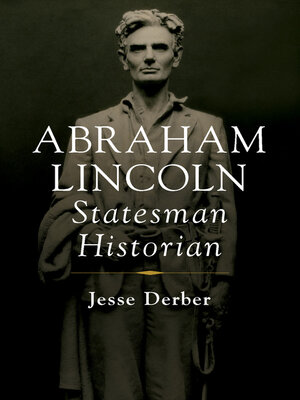
Sign up to save your library
With an OverDrive account, you can save your favorite libraries for at-a-glance information about availability. Find out more about OverDrive accounts.
Find this title in Libby, the library reading app by OverDrive.



Search for a digital library with this title
Title found at these libraries:
| Library Name | Distance |
|---|---|
| Loading... |
Abraham Lincoln drew upon history in his political career and particularly when crafting the rhetorical masterpieces that still resonate in the present day. Jesse Derber explores how Lincoln's views of the limits of human understanding drove a belief in—and untiring pursuit of—historical truth.
Lincoln embraced the traditional ideas that good history made good statesmanship and that an understanding of the past informed decision-making in the present. Seeing history as a source of wisdom, Lincoln strove for accuracy through a combination of research, reasoning ability, emotional maturity, and a willingness to admit his mistakes and challenge his biases. His philosophy flowed from an idea that authentic history could enlighten people about human nature. Though he revered precedents, Lincoln understood the past could be imperfect, and that progress through change was an ineffable part of building a better nation.
Perceptive and revealing, Abraham Lincoln, Statesman Historian looks at how the Lincoln practiced history and applied its lessons to politics and leadership.
|Introduction
Chapter 1. A Living History (1809–39)
Chapter 2. The Emerging Historian (1839)
Chapter 3. History and Human Nature (1840–53)
Chapter 4. We Are Not What We Have Been (1854–56)
Chapter 5. The Logic of History: The Lincoln Douglas Debates (1857–58)
> Chapter 6. Right Makes Might: Lincoln's Address at Cooper Union (1859–60)
Chapter 7. The Mystic Chords of Memory (1861–62)
Chapter 8. We Cannot Escape History (1862–63)
Chapter 9. The Almighty Has His Own Purposes (1864–65)
Chapter 10. The Wisdom of History
Acknowledgments
Notes
Bibliography
Index
|"Jesse Derber comprehensively examines a neglected topic—Lincoln as a historian—offering sound commentary on familiar speeches like those on the Mexican War, the Dred Scott decision, the House Divided, and both Inaugurals, and less well-known works. This is a welcome addition to the Lincoln literature."—Michael Burlingame, author of The Black Man's President: Abraham Lincoln, African Americans, and the Pursuit of Racial Equality|Jesse Derber is an independent scholar.







